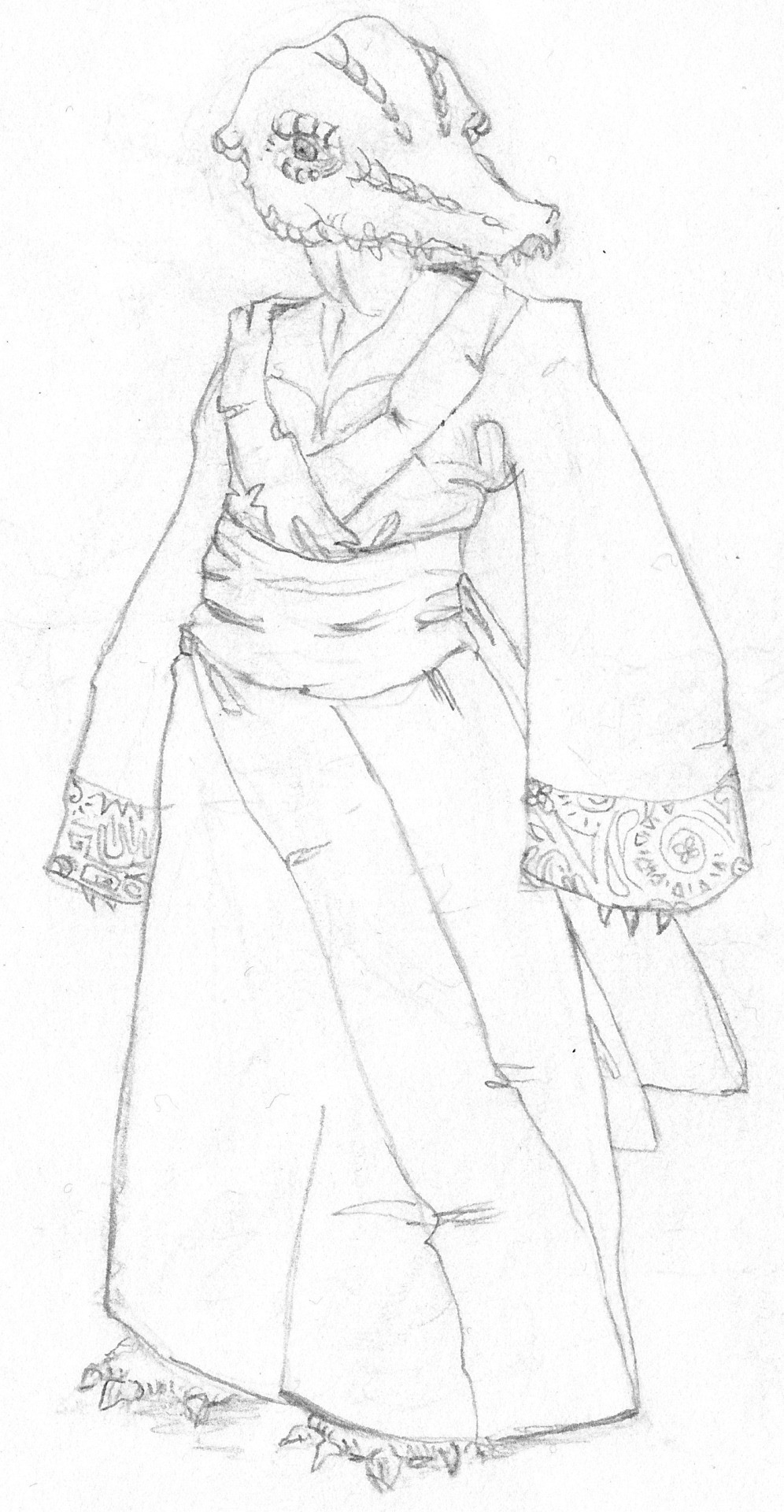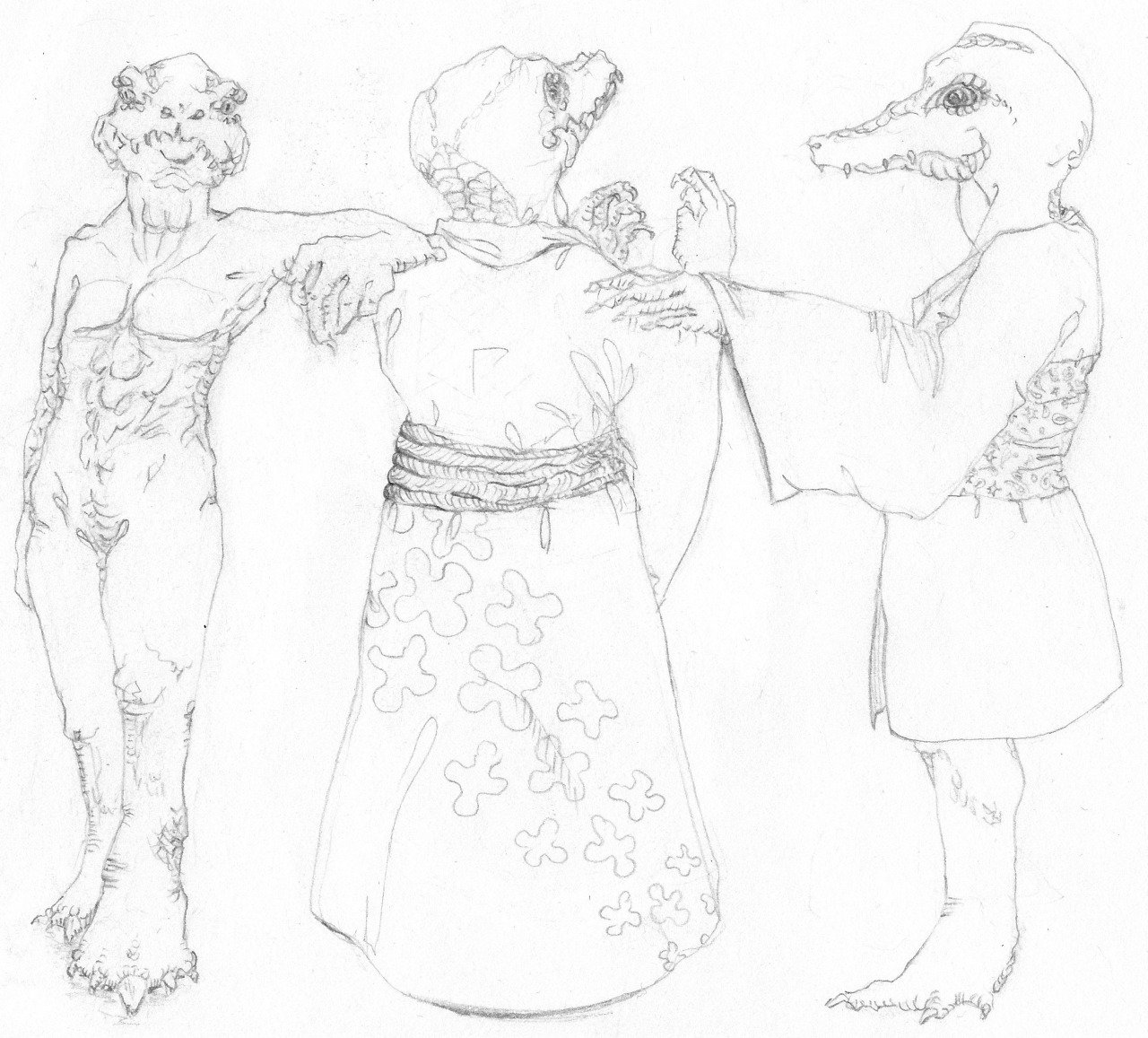 Oukek are a short, lithe people, very much like small humans but reptilian in appearance. Their faces are thin and long, and their lizard-like skin ranges in color from vibrant green or bright turquoise to dull brown or muted orange. Their typical life expectancy is approximately 50 years.
Oukek are a short, lithe people, very much like small humans but reptilian in appearance. Their faces are thin and long, and their lizard-like skin ranges in color from vibrant green or bright turquoise to dull brown or muted orange. Their typical life expectancy is approximately 50 years.Oukek society is rigidly defined by a caste social structure that seems impenetrably complex to outsiders. The distinctions seem to be a form of feudal nobility based on birth order, and Oukek of the same family can sometimes have wildly different roles in Oukek society. "Noble" Oukek are allowed to own weapons and property, and in general the lower castes of Oukek work for the "nobles" and do not own anything of value themselves.
Those who have visited the Oukek homeland speak of nearly incomprehensible social orders and a rigidly martial society. An Oukek's place in society is determined by who is birthed from a clutch of eggs first, the first to emerge is the highest-born, or noble, and the last to be born are the laborer caste. The "noble" castes are in charge and consider their place a divine right, but they also consider their role to be duty bound to protect and care for the lower castes. Oukek seem to be able to tell each other apart by their keen sense of smell.
The caste social structure is also their law, and those who rebel from the castes are no longer considered Oukek. Outsiders are not considered part of the social structure, and any who visit Oukek lands should expect to be met with disdain if not outright hostility. Masadhi are the only known outsiders who Oukek welcome with curiosity or goodwill, because they "have no smell," and thus many Masadhi can be found traveling the Oukek lands. The short stature of the Masadhi also probably doesn't hurt.
Oukek see wealth and property as symbols of status, and members of the lower Oukek castes will refer to money and belongings not as their own but rather to a member of a higher caste whom they answer to. Oukek individually are industrious workers, generally peaceful, and eerily quiet. They enjoy physical humor and storytellers, and many outcasts will travel with Troupers.
 Most Oukek homes are burrows, usually in dirt or loamy hills, and are often surrounded by large gardens and farms which the Oukek tend diligently. In their homeland they build squat wooden homes and tall stone towers. Because Oukek are honest, friendly, and deferential they tend to get along with other races. Junians tolerate the Oukek, and they are generally considered to be somewhat soft and harmless. Dwarves enjoy Oukek company, and their Weargs have been known to act as mounts or guards for Oukek villages. Aurymites are less tolerant and they have been known to hunt and eat Oukek.
Most Oukek homes are burrows, usually in dirt or loamy hills, and are often surrounded by large gardens and farms which the Oukek tend diligently. In their homeland they build squat wooden homes and tall stone towers. Because Oukek are honest, friendly, and deferential they tend to get along with other races. Junians tolerate the Oukek, and they are generally considered to be somewhat soft and harmless. Dwarves enjoy Oukek company, and their Weargs have been known to act as mounts or guards for Oukek villages. Aurymites are less tolerant and they have been known to hunt and eat Oukek.
No comments:
Post a Comment